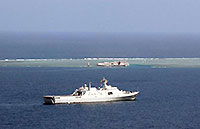Suicide bomber kills at least 70 at Pakistan hospital, IS claim responsibility
(Agencies) Updated: 2016-08-09 09:47US CONDEMNATION
The White House condemned the attack. "We remain resolute in joining with the people of Pakistan in confronting terrorism in Pakistan and across the region," it said in a statement.
Television footage showed scenes of chaos at the hospital in Quetta, with panicked people fleeing through debris as smoke filled the corridors.
Bodies lay strewn across a hospital courtyard shortly after the blast and pools of blood collected as emergency rescuers rushed to identify survivors.
The motive behind the attack was unclear, but several lawyers have been targeted during a recent spate of killings in Quetta, the provincial capital of Baluchistan, which has a history of militant and separatist violence.
The latest victim, Bilal Anwar Kasi, was shot and killed while on his way to the city's main court complex, senior police official Nadeem Shah told Reuters. He was the president of Baluchistan Bar Association.
The subsequent suicide attack appeared to target his mourners, said Anwar ul Haq Kakar, a spokesman for the Baluchistan government.
"It seems it was a pre-planned attack," he said.
Police cordoned off the hospital following the blast, with Prime Minister Nawaz Sharif and Army Chief General Raheel Sharif paying visits to the wounded on Monday evening.
In January, a suicide bomber killed 15 people outside a polio eradication centre in an attack claimed by both the Pakistani Taliban and Jundullah, an Islamist militant group that has pledged allegiance to Islamic State in the Middle East.
Monday's attack was the deadliest in Pakistan since an Easter Day bombing ripped through a Lahore park, killing at least 72 people. Jamaat-ur-Ahrar also claimed responsibility for the bombing.
Quetta has long been regarded as a base for the Afghan Taliban, whose leadership has regularly held meetings there in the past.
In May, Afghan Taliban leader Mullah Akhtar Mansour was killed by a US drone strike while travelling to Quetta from the Pakistan-Iran border.







